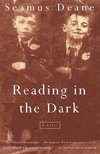 I just finished reading, though the novel is not yet finished with me, Reading in the Dark by Seamus Deane. The story follows a family in Northern Ireland from 1945 to 1971, though most of the drama, muted yet roiling, occurs in the 50s. The narrator is the third child, the second son, and unnamed throughout the pages. Delivered in brief chapters, and recalled like a dozen fragments of dreams the night before, the novel is thick with a suspense so persistent that even the lighter moments do not betray the ever-present haunting of the family's history. The narrator becomes almost an apprentice of the secrets, an archaelogist or even a curator of an invisible museum whose permanent exhibit is his mother and what she knows, may know, and may have told. Of what she keeps.
I just finished reading, though the novel is not yet finished with me, Reading in the Dark by Seamus Deane. The story follows a family in Northern Ireland from 1945 to 1971, though most of the drama, muted yet roiling, occurs in the 50s. The narrator is the third child, the second son, and unnamed throughout the pages. Delivered in brief chapters, and recalled like a dozen fragments of dreams the night before, the novel is thick with a suspense so persistent that even the lighter moments do not betray the ever-present haunting of the family's history. The narrator becomes almost an apprentice of the secrets, an archaelogist or even a curator of an invisible museum whose permanent exhibit is his mother and what she knows, may know, and may have told. Of what she keeps.The secret involves the IRA, a former lover, an informer, an execution in error. And how the secret mutates in the son's understanding, as he ages in the novel.
The sentences are poetic in construction; the words themselves of a precise poetry, a simple poetry. And then a perfectly articulated description strikes from the page, thunderous, and like white lightning.
A factory opens down the road called Birmingham Sound Reproducers, employing many locals, and supplying many neighbors with cheap phonographs. The narrator's father plays three albums over and over, a collection of arias. One is described thusly:
It wound out from the black disc in long sorceries of sound.
I am a poor book reviewer, and typically can never coherently describe a story I've just read. I'm much better at song reviews, where emotion is at the forefront.
Reading in the Dark is unquestionably one of my top five favorite books, affecting me so strongly that rather than promoting it, I am more inclined to keep it to myself.
Like a secret.

No comments:
Post a Comment